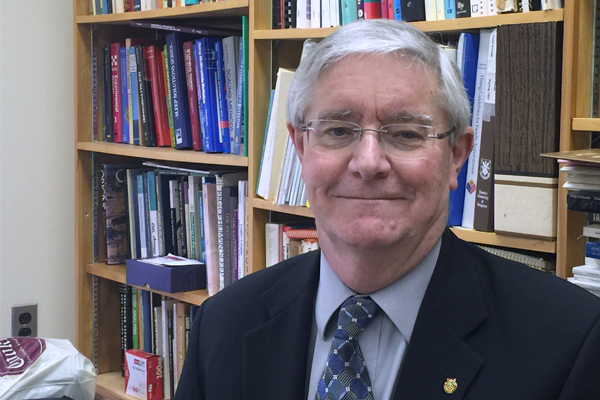An expert view
April 13, 2016
Share
Queen’s University researcher Alistair MacLean was selected by the Royal Society of Canada (RSC) to present a Canadian perspective on an expert panel report on the effects of driver fatigue on commercial vehicle drivers.

Dr. MacLean, a psychologist at Queen’s University, was selected based on his recent research on sleepiness and performance, in particular driving performance, and on the recommendation of his colleague Queen’s biologist John Smol.
“It's an honour to be asked to provide the Canadian context to this important research," says Dr. MacLean. "I hope that, through research such as this panel report, we can help better educate and inform readers about this crucial safety issue."
The findings were published by the RSC’s sister national academy, the National Academies in the United States. Titled, “Commercial Motor Vehicles Driver Fatigue, Long-Term Health, and Highway Safety: Research Needs,” the report analyzes the body of research on sleep and health and the resulting effects on road safety.
An estimated 20 per cent of vehicle crashes are estimated to be due to sleepiness and fatigue. Commercial vehicle drivers, who make a substantial contribution to the Canadian economy, face the continual pressure of balancing safety and the need to meet deadlines. The role of fatigue is a potentially preventable contributor to death and injury.
Dr. MacLean highlights that the report points to gaps in existing knowledge about the effect of fatigue and other health issues on commercial vehicle drivers. Emphasized throughout the report is the volume of research available on fatigue and automobile safety and the lack of an equivalent amount of research on drivers of commercial vehicles. While some literature suggests that comparisons can be made between non-professional private drivers and professional, highly experienced commercial vehicle operators, more research is needed to confirm this and extend our understanding of the relationship between fatigue, health and safety. The panel offers a substantial number of recommendations for future research.
In developing the Canadian perspective on the report, Dr. MacLean also points out the particular challenges, such as climate and weather, faced by Canadian drivers and the important role of Transport Canada in collaborating on the development of fatigue management programmes.
Dr. Maclean’s full comments can be found in the Reports from Abroad series on the Royal Society of Canada website. The full report from the National Academies Panel on Research Methodologies and Statistical Approaches to Understanding Driver Fatigue Factors in Motor Carrier Safety and Driver Health can be found here.